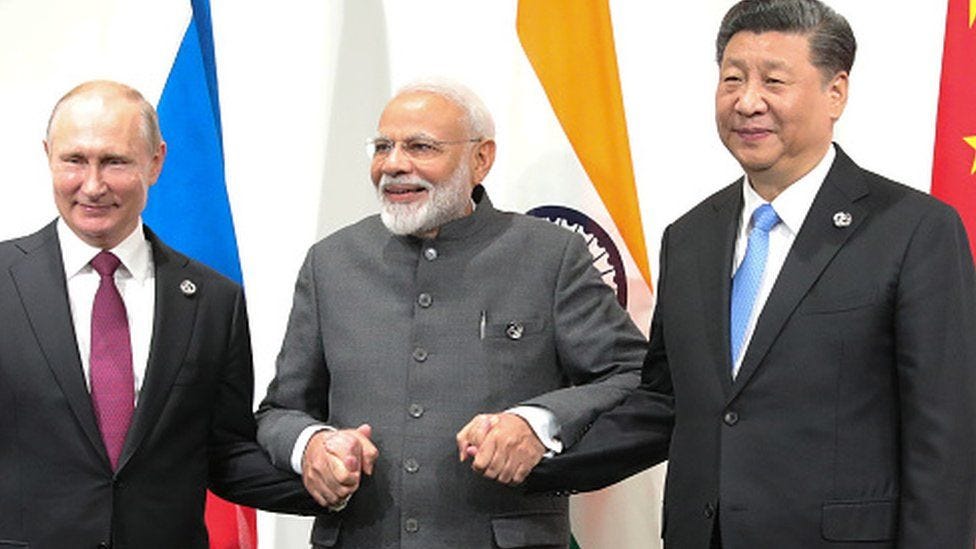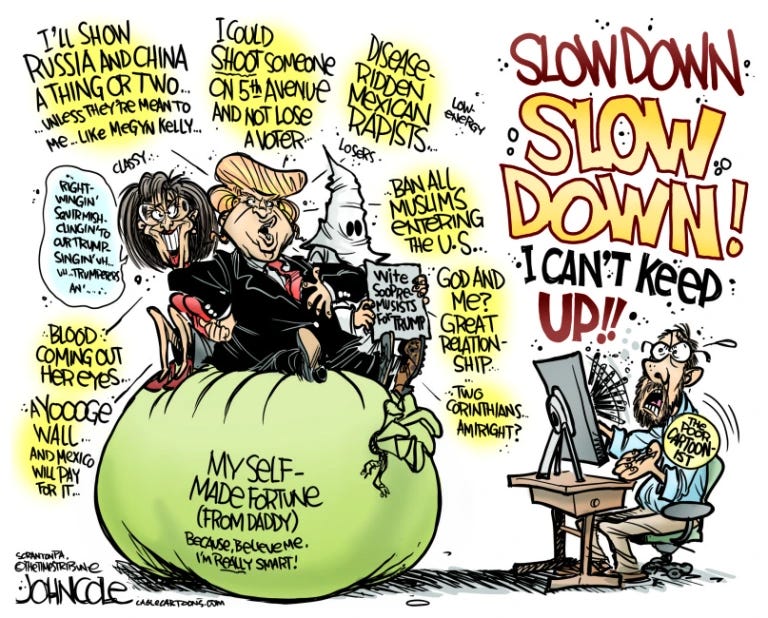NSS, National Security Strategy objectives with a new Republican House
With a tiny majority
Today’s TAT may seem a bit disjointed, but I can assure you, it will be one of the more important ones for the next couple of years. It won’t be important because of what I write but will matter depending on the accuracy of the expert opinions posted in yesterday’s, The Atlantic Council piece. A little of today’s focus revolves around the Russia, China and India thoughts I’ve discussed earlier in the week, but more so around the issue of sources, for the opinions and facts that I share about them.
For those that occasionally follow the embedded links in my articles, I exercise all due diligence to find, evaluate and maintain the sources offering the highest levels of credibility. Occasionally, I will bring you some insights into my “go-to” sources. Today, I’ll talk about our foreign policy regarding primary threats, through the eyes of The Atlantic Council, a long-time, top 5 source on my list.
My personal beliefs lineup quite well with my primary source, think-tanks. I don’t align perfectly with any of them, but the folks at the Atlantic Council (AC) are a close fit.
Their work published yesterday after the House of Representatives was called for the Republican Party, discusses what we can expect for the next couple of years from Congress. Since TAT is about threats, my focus regarding this work pertains to how the new, Republican led House will impact our NSS, National Security Strategy objectives, or not.
My last note here in the introduction is to inject one critical note into this piece, and as a full disclaimer, this concern is exclusively mine, not the AC’s.
All of this comes down to whether or not the House of Representatives under Speaker McCarthy will attempt to govern or continue the Trump era penchant for culture wars, conspiracy theories and retribution. I hope that the new Speaker heard the American people on Nov. 8th, that they are fed up with the conspiracy theory, histrionics of the Trump era. Now it’s time to govern, not seek political vendettas. My fingers are crossed… all of them.
Like all of think-tanks on my list of credible sources, they are affiliated with world-class expertise. It’s one thing to be intellectual but quite another to be intellectual and experienced. True expertise on all threats pertaining to the US and our allies, require leadership with both, and in the absence of a long operative career, the willingness to thoroughly understand the operational aspects of an intellectual focus. These are the leaders we require for security and progress.
Today’s linked article from the AC includes short 3-5 paragraph insights by ten of the world’s best experts regarding policy issues of importance, and how a slight Republican majority in the House may impact their areas of expertise. The entire article is worth reading… carefully. Like most of you with a busy schedule, I appreciate that it’s broken up into the ten shorter insights which allows reading over time rather than at a sitting.
My primary concerns were almost all addressed in one or more of the ten focus areas. Most acute at the moment is that the experts seem to agree that with only a slight advantage in the House, Republicans will be hesitant to attempt restricting aid to Ukraine as planned, at least through 2023. Like most Americans and our allies, I breathed a tentative sigh of relief at this assessment. In the midterm campaigns, there was a recurring theme of defunding or diminishing aid to Ukraine by Republican candidates. Yes, this is beyond baffling and even more so… un-American. Let’s all keep our fingers crossed that our experts are right.
Another area of focus was on some analysis of how Republican initiatives may attempt to impact how foreign aid is offered. My interpretation of the Council’s analysis is that the discussed changes were to the benefit of corporations rather than benefitting foreign policy. This sounds murky so allow me to offer an example.
Let’s say that the US and our allies/ partners see investment in a region as a required piece of our strategy to deter Chinese aggression. Projected new changes to policy would discourage overall investment in favor of only direct investment that would narrowly benefit corporate interests or some very specific US need. Done well, both US security and corporate interests can succeed. They are not mutually exclusive.
In China’s case, our investment related to specific national security needs, like Chinese aggression, require wide-spectrum investment that doesn’t always have a dollar return tied to it. Bolstering democracy in Asia is such an example. Free, empowered nations are a hurdle to Xi’s aggression, mostly because the key to his aggression is the BRI, which spans the globe. Xi requires subservience or domination along the BRI in order to succeed with his intentions for a world full of tributary states. Strategy requires intelligence far broader than business intelligence. Not supporting US security because there’s no immediate personal benefit is more in the selfish category than in the, do it because it’s the right answer, category. Time will tell so I am not throwing stones… just yet. My objective is that we get strategy right for all, not just for some convoluted party primacy. This perspective applies to both parties equally.
The only point that I wish received more attention from all think tanks is the issue of India under Modi. I have long been a fan and supporter of India, but under Modi and despite mountains of research I cannot shake my personal apprehension that our trust is misplaced, at least for the time being. Modi in India is India’s Trump, divisive and unworthy of loyalty. Loyalty and trust must be earned. Following my Midwestern, common-sense instincts, his actions do not match his words and therefore deprive him of the trust we need to see clearly before advancing our relationship further. The US shouldn’t care that India needs Russian oil for its defunct grid and other power requirements. We do care that Modi helps Putin avoid sanctions and helps to use Russian (sometimes stolen Ukrainian) grain to shape market prices and control. Does Modi truly believe that Putin won’t take India’s money for gas and oil if Modi condemns genocide? Preposterous!NSS

Overall, yesterday’s work from the Atlantic Council left me more optimistic than I had anticipated. If we can finally start moving towards bipartisanship, without the drama and employing knowledge rather than selfish interests, we have a chance to sustain the rebuilding of our global leadership role, nearly destroyed by the Trump administration. Hopefully Speaker McCarthy, will adhere to the opinions of the Atlantic Council’s experts, instead of the destructive, full support he gave to Trump.



